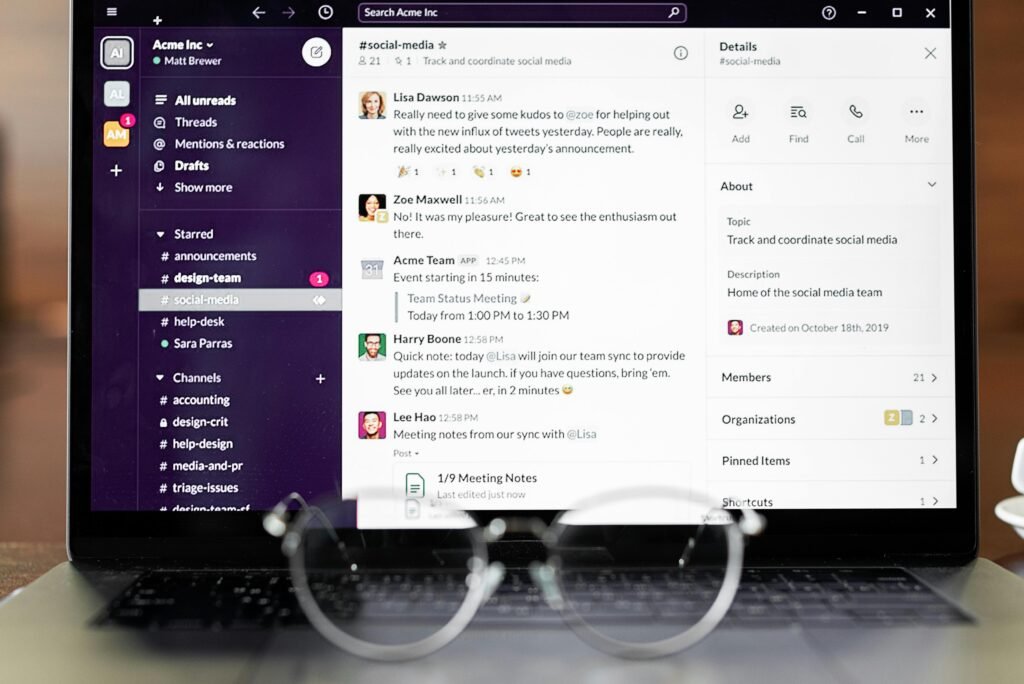In a digital-first world, effective internal communication is no longer a luxury—it’s a necessity. Whether your team is remote, hybrid, or in-office, choosing the right communication tool can significantly boost collaboration, productivity, and transparency.
Among the many platforms available, Slack, Google Chat, and Discord stand out as some of the most popular and versatile solutions for business communication. Each offers its unique advantages, user experiences, and integrations. So which one is best for your organization?
In this article, we’ll break down the core features, pros, cons, and ideal use cases for each platform—helping you make an informed decision.
1. Slack: The Enterprise Leader in Team Communication
Overview
Slack is arguably the most well-known business messaging tool. Built specifically for workplace communication, it allows real-time messaging, file sharing, integration with 2,000+ apps, and powerful automation tools.
Key Features
- Channels for team/project-specific conversations
- Direct messages and group DMs
- App integrations with Google Drive, Trello, Jira, Zoom, etc.
- Workflow Builder to automate tasks and notifications
- Threaded conversations for organized discussions
- Advanced search functionality with filters and modifiers
- Enterprise-grade security and SSO support
Pros
- Highly polished user experience
- Extensive app ecosystem
- Reliable, fast, and scalable
- Excellent mobile and desktop apps
- Custom emojis, bots, and integrations
Cons
- Pricey for larger teams (especially on paid plans)
- Can become noisy if not well-managed
- Limited message history on the free plan
Best For:
- Medium to large teams
- Project-based agencies
- Tech and SaaS companies
- Teams needing integrations and automation

2. Google Chat: Seamless Integration in Google Workspace
Overview
Formerly known as Hangouts Chat, Google Chat is now a modern messaging tool integrated into the Google Workspace ecosystem. If your organization uses Gmail, Calendar, and Drive, Chat provides a simple and intuitive messaging extension.
Key Features
- Spaces (previously Rooms) for topic or team discussions
- Threaded messages within conversations
- Seamless integration with Gmail, Calendar, Sheets, and Meet
- Searchable chat history
- Built-in bots and custom apps support
- Included with Google Workspace subscriptions
Pros
- Native to Google Workspace
- Easy onboarding for Gmail users
- Minimal, clean interface
- Zero additional cost for Workspace users
- Integration with Google Tasks and Calendar
Cons
- Less feature-rich than Slack
- Limited third-party integrations
- Fewer customization and automation options
- Not as intuitive for non-Google users
Best For:
- Organizations already using Google Workspace
- Smaller teams looking for low-friction communication
- Companies that prioritize simplicity and Google-native workflows

3. Discord: From Gamers to Growing Businesses
Overview
Originally designed for gamers, Discord has evolved into a powerful community and business communication tool. It offers voice channels, text chats, and video conferencing in an always-on environment, making it increasingly popular among startups and remote teams.
Key Features
- Servers and channels for topic-based discussions
- Always-on voice channels for team hangouts
- Video and screen sharing
- Custom roles and permissions
- Bot integrations and API access
- Free tier with generous limits
Pros
- Extremely customizable
- Great for community-building and informal collaboration
- Supports large numbers of users for free
- Fast, lightweight, and well-optimized
Cons
- Perceived as “too casual” for traditional business settings
- UI can be overwhelming for non-tech users
- Limited formal business integrations
- Notifications can be noisy without proper setup
Best For:
- Startups and creative teams
- Developer communities
- Remote-first teams with informal culture
- Internal team events or voice-based collaboration

Head-to-Head Comparison
| Feature | Slack | Google Chat | Discord |
|---|---|---|---|
| Designed For | Business use | Google Workspace | Communities & teams |
| Integrations | 2,000+ | Google ecosystem | Bots, custom APIs |
| Voice & Video | With Zoom/Meet | Via Google Meet | Built-in |
| Threaded Chats | Yes | Yes | No (limited) |
| Search Functionality | Advanced | Moderate | Basic |
| Pricing | Free & Paid Tiers | Included in Workspace | Free (premium Nitro optional) |
| Customization | Medium | Low | High |
| Security Features | Enterprise-grade | Google-level | Basic to Moderate |
Which Platform Is Right for Your Business?
Choosing the right platform depends on your team size, company culture, industry, and tech stack.
- Go with Slack if you’re looking for a polished, scalable solution with advanced integrations and automation. Ideal for SaaS, tech, and multi-team companies.
- Choose Google Chat if your team already lives in Gmail, Calendar, and Sheets. It’s a seamless, lightweight solution that covers the basics.
- Consider Discord if you’re a remote-first, startup culture that values informal but rich communication — especially with a dev or community element.

Bonus: Other Noteworthy Communication Tools
- Microsoft Teams – Best for companies using Microsoft 365
- Twist – A distraction-free alternative from the makers of Todoist
- Mattermost – An open-source Slack alternative focused on privacy
- Rocket.Chat – Customizable and self-hostable messaging platform
Final Thoughts
Communication tools are the heartbeat of modern teams. Whether you’re managing projects, collaborating with colleagues, or aligning goals across departments, selecting the right platform can improve efficiency, morale, and even retention.
Evaluate your team’s current workflow, required integrations, and communication style — and test a few options before committing.
Want to digitize your business with the right tech stack and communication tools? Visit Rakuzan.eu for digital transformation services tailored to your organization.
Need a reliable hosting solution for your next business platform or SaaS tool? Get started with Hostinger — a trusted provider that supports scalable growth.
Disclaimer: This article is for informational purposes only and does not constitute financial, tax, or investment advice. Readers should consult with a licensed professional before making any financial or business decisions.





